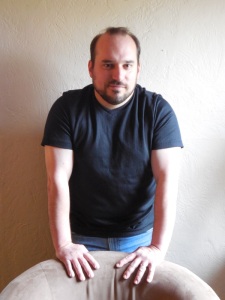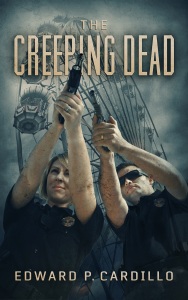Guest Post: Edward P. Cardillo #WinterofZombie
Can Zombie Fiction Be Literary?
By Edward P. Cardillo
All too often I see zombie novels referred to in such a way that they are not considered by some to be “literary” or “serious” literature. “This was great for a zombie book,” or “a fun read, but not a serious book.” Genre literature has always been looked down on by the literary crowd, particularly zombie fiction. While there are poorly written works found in any genre, I seek to debunk this point of view as a generality, and I will elaborate my reasons, but first let’s start out with the definition of “literary”:
“Literary Fiction is a term principally used for certain fictional works that hold literary merit. In other words, they are works that offer deliberate social commentary, political criticism, or focus on the individual to explore some part of the human condition.” (Wikipedia)
1.)Deliberate Social Commentary-While many zombie books translate to fast-paced, action-packed thrill rides, some do stop to engage in social commentary. It can be said that people learn about who they are when in the middle of a crisis. During a zombie outbreak, as society crumbles, much can be learned about who we are as a people as well as individuals. Zombies will initially be mistaken for drunks, drug addicts, or mentally-ill as they emerge. How are these individuals treated in modern society? Do the police open fire on sight, or do they attempt to restrain and get help? Will the authorities suspend civil rights and employ quarantine, or respect individual freedoms and fail to contain the virus? Will the government enact martial law? How will individuals and groups survive in the aftermath? Do they band together or go it alone? Do they try and help others, or do they kill and steal to preserve resources?
2.)Political Criticism-How will Republicans/Democrats react to a zombie outbreak/apocalypse? Firearms are well represented in the zombie genre. However, depending on where you are from and the politics of your region, guns may be readily available or scarce. How will the President react? Will Congress appropriate funds to combat the pandemic in a timely manner, or will they dawdle while the country burns? Will mayors and governors become despots in their own martial fiefdoms, free from the oversight of bigger government? Will taxes still be collected? Will survivors become ruthless mercenaries or join communes after the dead have taken the earth? Do the survivors trade in a barter economy or create a socialist democracy?
3.)Explore Some Part of the Human Condition-Many zombie books examine how individuals react during an outbreak and during a zombie apocalypse. Character arcs are crucial in exploring this. What did characters do before the outbreak/apocalypse? How has the apocalypse changed them? Did the priest become a ruthless killer, the librarian a badass zombie slayer, the police officer a farmer growing crops for food in a commune, or the prostitute the new leader of the human resistance? Do violent criminals thrive in the apocalypse while the meek suffer as prey for the dead and other living? What do the wealthy do when their currency in this world no longer holds any value?
The truth is, many zombie books address some or all of these elements. I’ve heard readers that swore their favorite zombie book made them laugh, cry, check under their beds at night, or want to throw their Kindle across the room. Some stories haunt the reader long after they’ve been finished. Some highlight the ideas of cooperation and altruism, the strength of family, and self-reliance while tapping into the primal fears of disease, death, and being eaten alive while living in a time of political and economic uncertainty. Some zombie novels have inspired readers to become more survivalist savvy. Tapping into zombie fever, the CDC even added a zombie apocalypse page to their website to increase awareness of disaster preparedness.
I believe the argument can be made that some zombie fiction is indeed “literary,” but at the very least I believe it can be much less shallow than some would have you believe.
Edward P. Cardillo, a member of the Horror Writers Association, writes horror, science fiction, and dark fantasy. He is the recipient of three Readers’ Favorite International Book Awards as well as J. Ellington Ashton Writer of the Year 2013, and has two novels in the Facebook Zombie Book of the Month Club Hall of Fame. Find out all about him and his work at edwardcardillo.com. By day, he is a clinical psychologist working with children, teens, and adults with Down Syndrome and on the autism spectrum.
* * * * *
The stench of frozen flesh is in the air! Welcome to the Winter of Zombie Blog Tour 2015, with 40+ of the best zombie authors spreading the disease in the month of November.
Stop by the event page on Facebook so you don’t miss an interview, guest post or teaser…and pick up some great swag as well!
Giveaways galore from most of the authors as well as interaction with them!
#WinterofZombie is the hashtag for Twitter, too!

